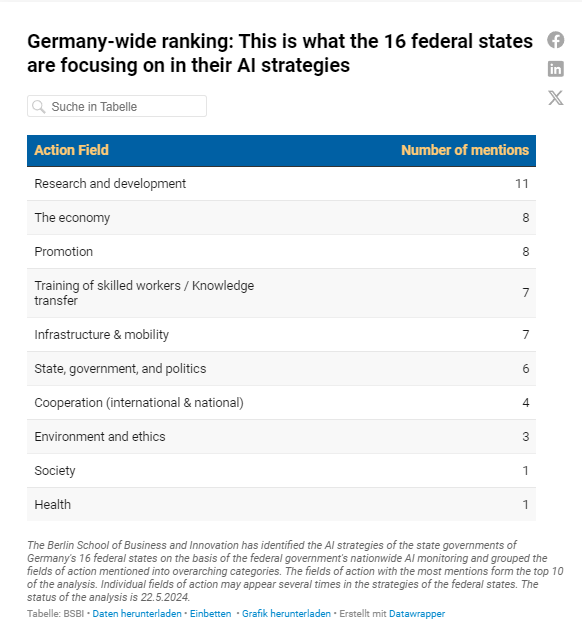
Germany-wide ranking: This is what the 16 federal states are focusing on in their AI strategies
Back in 2018, the German government adopted a national AI strategy to make Germany a leading location for the development and application of AI technologies and to ensure global competitiveness. The strategy paper was updated in 2020. The federal government plans to provide a total of five billion euros for its implementation by 2025. However, the individual German state governments also have strategic goals and concrete measures in the field of artificial intelligence for their respective states. We at the Berlin School of Business and Innovation (BSBI) has analysed the strategy papers of Germany’s 16 federal states and defined the key fields of action.
Research and development is the most frequently cited field of action
The study clearly shows that the nationwide focus is on the expansion and promotion of AI research and development. This field of action is mentioned 11 times in the strategy papers analysed, putting it in first place in the ranking. In this context, more than half of all German federal states are endeavouring to create new AI professorships or establish various research centres. Saarland, for example, is aiming to develop an AI hotspot in the key areas of automotive, Industry 4.0, eHealth and eGovernment. The city state of Berlin would like to support the merger of the two AI competence centres funded by the Federal Ministry of Education and Research (BMBF) with the interlinking of AI activities at all Berlin universities.
Economy and promotion share 2nd place
The areas of business and funding received a total of eight mentions in the AI strategies analysed, sharing second place. In central Germany, the federal states of Saxony and Saxony-Anhalt are focussing on improving working conditions for employees through the use of artificial intelligence. In south-west Baden-Württemberg, one of the aims is to strengthen SMEs by setting up 19 regional AI labs as contact points for small and medium-sized enterprises (SMEs). The funding field of action focuses on projects that serve the development of AI applications and technology transfer. The Thuringian AI strategy consists of several factors in the area of funding, such as the Digital Bonus as a low-threshold offer for SMEs.
Training of skilled labour and expansion of infrastructure mentioned 7 times in AI strategies
In third place are two fields of action: Both the training of skilled workers and the expansion of infrastructure are mentioned seven times in the AI strategy papers of the German federal states analysed. In North Rhine-Westphalia in particular, the state government is focussing on the education and training of pupils, trainees, students, and professionals. To this end, various initiatives for AI qualification and securing young AI talent as well as lifelong learning are being promoted. Lower Saxony and Saxony-Anhalt are leading the way in terms of infrastructure and mobility. Among other things, the two federal states are focussing on the development of a common European data infrastructure and the expansion of a digital infrastructure.
International and national cooperation only in 5th place among the identified fields of action
Only six of all federal states mention the networking and practical application of artificial intelligence in administration and the public sector in their AI strategies (4th place). The individual state governments see even less need for action when it comes to international and national cooperation in the field of AI. According to the strategy paper, only three federal states (Bremen, Rhineland-Palatinate, Schleswig-Holstein) explicitly pursue the goal of joint exchange and networking beyond their borders.
Schleswig-Holstein sees area of action in society, Brandenburg focusses on health
Germany’s northernmost federal state, Schleswig-Holstein, is the only one to explicitly state that it also wants to utilise AI in the area of society. For example, forward-looking solutions for citizen-centred digital administration are to be developed by the “Joint Innovation Lab”. In Brandenburg, AI is focussed on the healthcare sector: Here, the Carl-Thiem-Klinikum Cottbus is to be transformed into a digital lead hospital.
About the investigation
The Berlin School of Business and Innovation has identified the AI strategies of the state governments of Germany’s 16 federal states on the basis of the federal government’s nationwide AI monitoring and grouped the fields of action mentioned into overarching categories. The fields of action with the most mentions form the top 10 of the analysis. Individual fields of action may appear several times in the strategies of the federal states. The status of the analysis is 22 May 2024.
